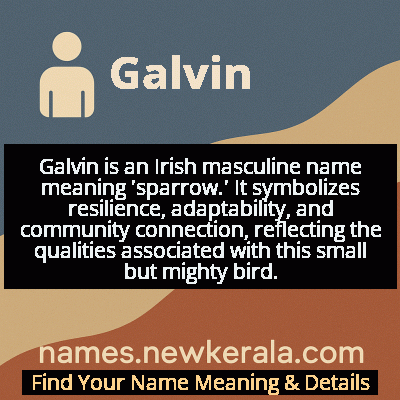Galvin Name Meaning & Details
Origin, Popularity, Numerology Analysis & Name Meaning of Galvin
Discover the origin, meaning, and cultural significance of the name GALVIN. Delve into its historical roots and explore the lasting impact it has had on communities and traditions.
Name
Galvin
Gender
Male
Origin
Irish
Lucky Number
2
Meaning of the Name - Galvin
Galvin is an Irish masculine name meaning 'sparrow.' It symbolizes resilience, adaptability, and community connection, reflecting the qualities associated with this small but mighty bird.
Galvin - Complete Numerology Analysis
Your Numerology Number
Based on Pythagorean Numerology System
Ruling Planet
Moon
Positive Nature
Diplomatic, friendly, artistic, empathetic.
Negative Traits
Over-sensitive, moody, indecisive, prone to self-pity.
Lucky Colours
Green, cream, white.
Lucky Days
Monday.
Lucky Stones
Pearl, moonstone.
Harmony Numbers
1, 3, 4.
Best Suited Professions
Diplomats, mediators, caregivers, artists.
What People Like About You
Cooperative spirit, friendliness, artistic talent.
Famous People Named Galvin
Jim Galvin
Baseball Player
Professional baseball pitcher in the late 1800s
Patrick Galvin
Poet and Writer
Irish poet and playwright exploring Irish identity
Michael Galvin
Actor
Long-running role in television series 'Shortland Street'
John Edward Galvin
Military Officer
United States Army general and Director of the Army Staff
Name Variations & International Equivalents
Click on blue names to explore their detailed meanings. Gray names with will be available soon.
Cultural & Historical Significance
Extended Personality Analysis
People named Galvin typically exhibit personality traits that reflect their name's sparrow symbolism – they are adaptable, resilient, and socially adept individuals. They possess a natural curiosity and observational skills that allow them to quickly assess situations and people, making them excellent problem-solvers and mediators. Galvins often demonstrate a unique blend of practicality and creativity, approaching challenges with both logical analysis and innovative thinking. Their communication style tends to be direct yet diplomatic, and they value authentic connections in their relationships. While they enjoy social interaction and community involvement, Galvins also cherish their independence and personal space. They're known for their loyalty to family and close friends, often serving as reliable anchors in their social circles. Their resilience enables them to bounce back from setbacks with renewed determination, much like the sparrow that continues to thrive in changing environments. This combination of social intelligence, adaptability, and inner strength makes Galvins well-equipped to navigate life's complexities while maintaining their core values and integrity.
Modern Usage & Popularity
In contemporary naming practices, Galvin maintains a steady presence as both a given name and surname, particularly within Irish and Irish-American communities. While not ranking among the top baby names, it has experienced a modest revival as parents seek distinctive names with cultural heritage. The name's usage is most prominent in countries with significant Irish diaspora populations, including the United States, Canada, Australia, and the United Kingdom. Modern parents often choose Galvin for its strong Irish roots, pleasant sound, and the positive symbolism associated with sparrows – representing resilience, community, and adaptability. The name fits well with current trends favoring surnames as first names and Celtic-inspired names, while its relative rarity ensures it stands out without being overly unusual. Galvin's modern appeal lies in its balance of tradition and freshness, making it an attractive choice for families wanting to honor their heritage while selecting a name that feels contemporary and distinctive.
Symbolic & Spiritual Meanings
Galvin carries profound symbolic meanings rooted in its association with the sparrow, which across cultures represents resilience, community, and the ability to find abundance in simplicity. The sparrow symbolizes everyday joy and the importance of small moments, reminding us that significance can be found in ordinary life. In Celtic tradition, birds served as messengers between the earthly and spiritual realms, giving Galvin connotations of communication, intuition, and spiritual awareness. The name also embodies themes of freedom and independence, as sparrows maintain their autonomy while thriving in community settings. Additionally, the brightness suggested by the name's etymological roots adds layers of symbolism related to clarity, enlightenment, and purity of purpose. This combination creates a rich symbolic tapestry where Galvin represents the harmonious balance between individual freedom and social connection, practical wisdom and spiritual insight, and the ability to find light and meaning in all circumstances of life.

